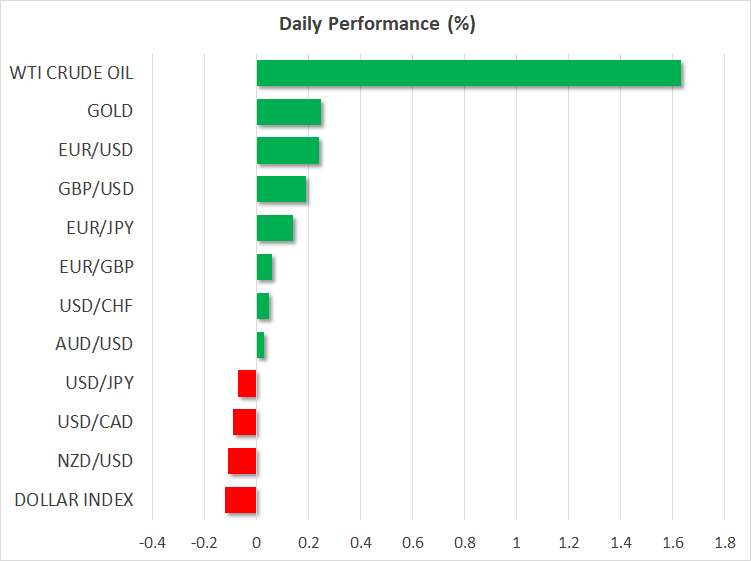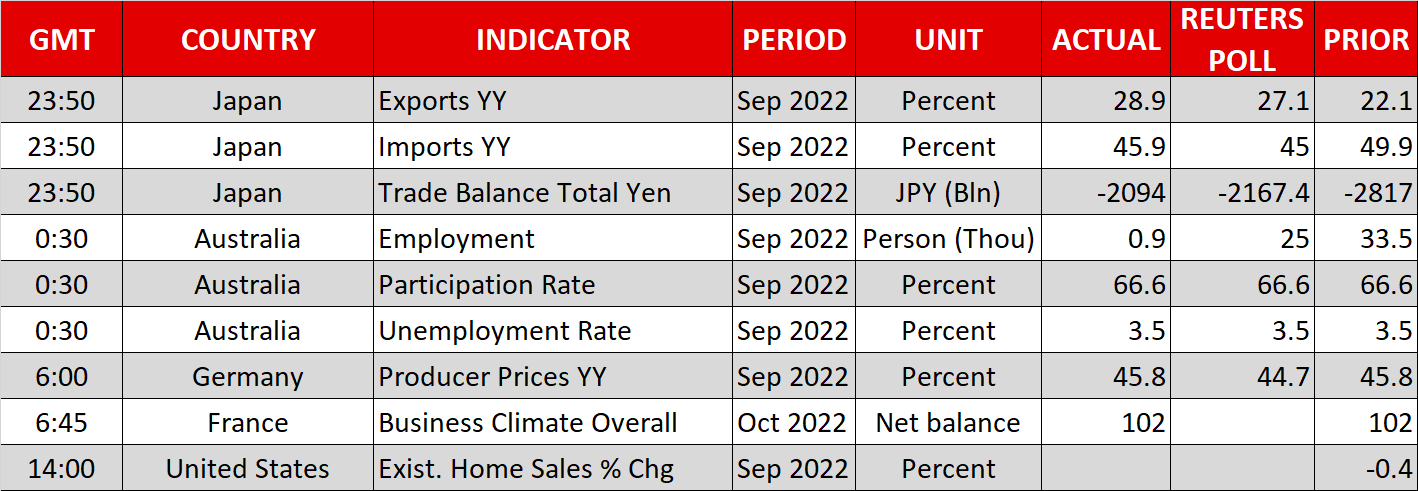- Rising Treasury yields weigh on stocks
- US dollar outperforms all the other majors
- Canadian inflation data beats forecast

Wall Street in the red as yields hit fresh multi-year highs
Wall Street closed in the red on Wednesday, breaking its two-day winning streak due to rising Treasury yields and weakness from earnings losers such as Abbott Laboratories (NYSE:ABT) more than offsetting strong gains from earnings winners like Netlix.
The yield on the 10-year Treasury note hit a 14-year high of 4.18% and the 2-year yield touched a 15-year high of 4.614%, as this week’s CPI data from New Zealand, the UK and Canada got investors wondering whether central banks around the world need to step up their efforts even more to bring inflation to heel.
With Minneapolis Fed President Neel Kashkari saying yesterday that job market demand remains strong in the US, and that underlying inflation has probably not peaked yet, market participants are now nearly fully convinced that the Fed will deliver another triple hike at its November gathering, while they see rates peaking at around 5% in May, which is higher than the Fed’s 4.625 median projection for next year. Yes, they are still pricing in a rate cut by November 2023, but even after the cut, interest rates are expected to be higher than the Fed’s estimate.
This implies that investors are now more hawkish than the Fed itself and thus, they may stay bearish overall on equities, even if they take advantage of buying opportunities during the earnings season due to better-than-expected results. More data pointing to worldwide inflation pressures not easing when most economies are struggling, could eventually prompt them to push the sell button.
Dollar briefly hits 150 yen
The rise in Treasury yields helped the dollar to outperform all its major peers yesterday, with dollar/yen trading within touching distance of the round number of 150.00 and keeping investors on high alert for any signs of intervention. The pair briefly hit 150.00 today. But with market participants raising their bets with regard to the Fed’s future hikes and the BoJ stubbornly sticking to its ultra-loose strategy, another round of intervention by Japanese authorities may just be seen as an opportunity to buy dollar/yen at better levels.
Having said all that, the overly hawkish and aggressive bets regarding the Fed’s future course of action raise the risk of the Fed failing to match market expectations. Any remarks by Fed officials suggesting that they will not proceed as forcefully as the market currently believes could result in a selloff in the greenback. This might happen at the upcoming Fed gathering on November 2 if the statement and Chair Powell’s conference are interpreted as less hawkish than expected.
Canadian inflation numbers raise bets of a 75bps rate hike
The Canadian dollar was the currency that lost the least ground against the greenback yesterday thanks to higher-than-expected headline inflation in Canada. The headline year-on-year rate edged down in September but was still higher than the forecast, while the underlying metrics stayed largely unchanged.
After the larger-than-expected slowdown in the August inflation print, market participants were expecting the BoC to drastically slow down its rate increases. They were largely anticipating a 50bps hike at next week’s gathering, and only two more quarter-point increments thereafter. That said, yesterday’s higher-than-expected headline rate encouraged some to bring back bets of a 75bps hike, with the terminal rate being lifted as well by almost 20bps.
What may have also given a helping hand to the loonie are rising oil prices. Oil gained 2.3% yesterday and another 1.6% so far today due to news that China is considering a cut in the duration of quarantine for inbound visitors. China is the world’s largest crude importer and thus, anything appearing as a first step towards easing its strict COVID-19 curbs is good news for oil traders.
